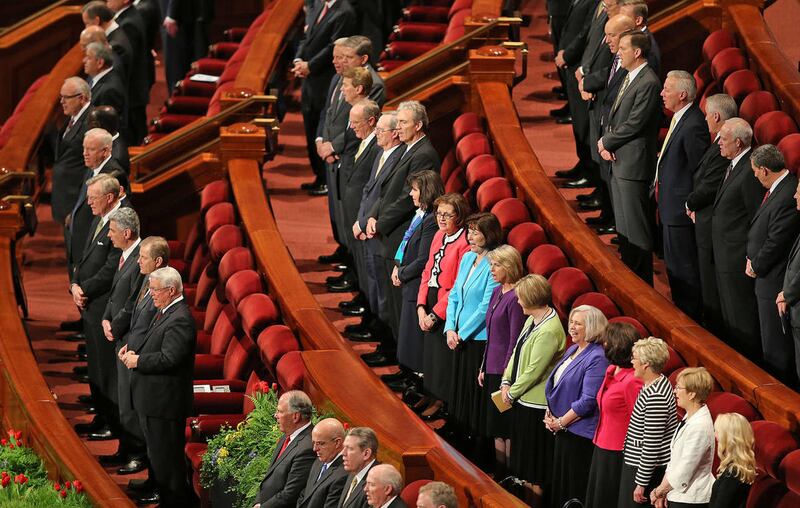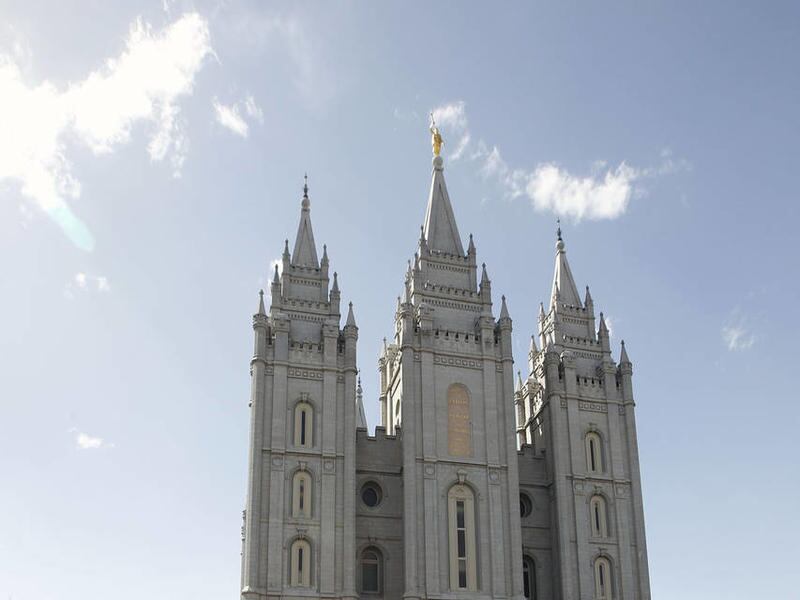SALT LAKE CITY — Sharing numerous stories of pain, loss and doubt, LDS leaders declared on Easter Sunday that every human fear, failing and fall is resolved by Jesus Christ and his Atonement.
"Today we celebrate the gift of victory over every fall we have ever experienced, every sorrow we have ever known, every discouragement we have ever had, every fear we have ever faced," said Elder Jeffrey R. Holland of the Quorum of the Twelve Apostles, "to say nothing of our resurrection from death and forgiveness for our sins. That victory is available to us because of events that transpired on a weekend like this more than two millennia ago in Jerusalem."
The first Easter Sunday "is the day that changed everything," said President Dieter F. Uchtdorf, second counselor in the church's First Presidency. "On that day, my life changed. Your life changed. The destiny of all God's children changed. On that blessed day, the Savior of mankind, who had taken upon himself the chains of sin and death that held us captive, burst those chains and set us free."
The gift of Easter morning is evidence of God's deep and everlasting love and can give all the hope to courageously face their very real struggles and uncertainties, said leaders throughout the weekend during the 185th Annual General Conference of The Church of Jesus Christ of Latter-day Saints.
Those who bind themselves to Christ through covenants will find that his comfort will help dispel mortal fears and quell despair through what Elder Holland called "the most consequential manifestation of divine love ever to be demonstrated in the history of the world."
"Truly," President Uchtdorf said, "the Apostle Paul was correct when he said we can 'comfort one another with these words.'"
Simultaneous to general conference and throughout Easter Sunday, a 15-second clip from the church's Easter video "Because He Lives" played automatically all day on the masthead of YouTube's homepage with scenes of Christ's crucifixion and resurrection.
Tens of millions saw the clip, which invited them to watch the entire two-minute video with its accompanying text, "Because he lives, if you reach out, call out, cry out, he is here. Then. Now. Always. ... No exceptions. No lost causes."
A rocky mission
The idea of no lost causes fit in with a notable number of intimate, relatable stories about trials and apprehensions that were shared throughout the conference.
Church President Thomas S. Monson told the story of a young LDS missionary who couldn't go where he was called to serve because of visa trouble and was reassigned to a different mission.
That setback was followed by discouragement because he felt missionaries in his new mission weren't equally dedicated to the work. Finally a health scare left him partially paralyzed, and he was sent home to recuperate.
When he healed, he was disappointed to learn he assigned to return to the same mission. President Monson said he went to the temple to seek comfort and confirmation he could have a good experience. As he prayed in the temple's celestial room, another young man felt impressed to interrupt him.
After the missionary shared his need for comfort, the other young man told him of his own successful mission, including the challenges and concerns he faced and how the Lord helped him.
Reassured, the missionary felt peace and realized God had answered his prayer. Only then did the two men realize they had served in the same mission.
“I had faith Heavenly Father would bless me," the missionary said, "but I never could have imagined that he would send someone to help me who had served in my own mission. I know now that all will be well."
Temples are considered the house of the Lord Jesus Christ by Latter-day Saints, and President Monson said they offer access to Christ's offers of comfort.
"In our lives we will have temptations," he said; "we will have trials and challenges. As we go to the temple, as we remember the covenants we make there, we will be better able to overcome those temptations and to bear our trials. In the temple we can find peace."
"Such peace," he added, "can permeate any heart — hearts that are troubled, hearts that are burdened down with grief, hearts that feel confusion, hearts that plead for help."
Dispelling fear
Endless daily reports of violence, disease, declining values and destructive storms generate fear and apprehension in many people, several leaders said.
Everyone will encounter challenges, said Elder Neil L. Andersen of the Twelve.
"We rejoice in our joys and satisfactions, and we hope to courageously face our struggles and uncertainties," he said. "Some difficulties are more severe than others, but no one is immune. ... This is our mortality."
He and others said Christ offers the salve for all wounds.
"Can we hush the fears that so easily and frequently beset us in our contemporary world?" asked Elder David A. Bednar of the Twelve. "The answer to this question is an unequivocal 'yes.'"
The Easter gift is the key to both dispelling mortal fears and settling spiritual despair, he said.
"Correct knowledge of and faith in the Lord empower us to hush our fears because Jesus Christ is the only source of enduring peace."
Christ's peace offers the perspective of eternity and "supplies a spiritual settledness, Elder Bednar added. The Atonement "makes repentance possible and quells the despair caused by sin."
The way to access peace and repentance is through ordinances and covenants that connect a person to Christ, become the building blocks of a foundation in him and his atonement and provide direction and confidence.
Faith journeys
Two speakers on Sunday told detailed stories about Latter-day Saints who struggled with doubt or church teachings.
One woman, after being married in the temple, began to question the foundations of her faith and became less active, said Sister Rosemary Wixom, the church's general Primary president.
“I was willing to extend courtesy to those without doubts," the woman said, "if they would extend courtesy to me.”
Many did.
"She learned," Sister Wixom added, "that when she came up against a statement that caused her to doubt, she 'could stop, look at the whole picture, and make the gospel personal.' She said, 'I would ask, ‘Is this the right path for me and my family?’ Sometimes I would ask myself, ‘What do I want for my children?’ I realized I want them to have temple marriages. That’s when belief came back to my heart.’”
Sister Wixom said that story taught her that "answers to our sincere questions come when we earnestly seek and when we live the commandments."
Another woman became disenchanted with church teachings, persuaded by some who mocked and criticized early church leaders. She stunned her family when she chose to leave the church, said her brother, Elder Brent H. Nielson of the Seventy.
He shared the story with his sister's permission. His family determined to follow the example of the father of the prodigal son and "figuratively let her go — but not without her knowing and feeling our sincere love for her."
Years later, through "the words of prophets and apostles and the love of her family," she was moved to return to the church.
Elder Nielson said he learned an important lesson, too. As his family studied the prodigal son story after his sister left the church, he heard it differently. He had always related to the son who stayed home. This time, he said, "I realized that in some ways I was the prodigal son. All of us fall short of the glory of the Father. All of us need the Savior’s Atonement to heal us. All of us are lost and need to be found. This revelation that day helped me know that my sister and I both needed the Savior’s love and his Atonement. Susan and I were actually on the same path back home."
The woman in Sister Wixom's story said Mother Teresa's story of living her religion without all the answers and without clarity in all things was an inspiration. She determined to focus on what she did believe.
“My testimony had become like a pile of ashes," the woman said. "It had all burned down. All that remained was Jesus Christ. But he does not leave you when you have questions. When anyone tries to keep the commandments, the door is wide open.”
Saved from a fall
The story of a young man who nearly fell from a cliff before his young brother grabbed him by both hands and pulled him to safety led Elder Holland to talk about how Christ rescued all mankind from the penalties of the fall of Adam.
"What a plight!" he said. "The entire human race in free fall — every man, woman, and child in it physically tumbling toward permanent death, spiritually plunging toward eternal anguish. Is that what life was meant to be? Is this the grand finale of the human experience? Are we all just hanging in a cold canyon somewhere in an indifferent universe, each of us searching for a toe-hold, each of us seeking for something to grip — with nothing but the feeling of sand sliding under our fingers, nothing to save us, nothing to hold on to, much less anything to hold on to us."
He called the three-day sequence of Atonement and Resurrection "the most consequential manifestation of divine love ever to be demonstrated in the history of the world."
"Jesus Christ suffered, died and rose from death in order that he could, like lightning in a summer storm, extend to us two helping hands, two brotherly arms to grasp us, hold us, and through our loyalty to him lift us up to eternal life.
"This Easter I thank him and the Father who gave him to us that Jesus still stands triumphant over death, although he stands on wounded feet. This Easter I thank him and the Father who gave him to us that Jesus still extends to us unending grace, although he extends it with wounded palms and wrists. This Easter I thank him and the Father who gave him to us that we can sing before a sweat-stained garden, a nail-driven cross and a gloriously empty tomb."
President Uchtdorf said Latter-day Saints should never lose their "sense of awe and profound gratitude" for the Easter gift.
"The Savior’s Atonement cannot become commonplace in our teaching, our conversation, or in our hearts."
Christ's grace allows all to overcome weaknesses and the "undercurrents and quicksands of the deceiver," he said. "Jesus Christ has cleared the way for us to ascend to heights incomprehensible to mortal minds."
"I have tried," President Uchtdorf said, "to understand the Savior’s Atonement with my finite mind, and the only explanation I can come up with is: God loves us deeply, perfectly, and everlastingly."
Email: twalch@deseretnews.com






































